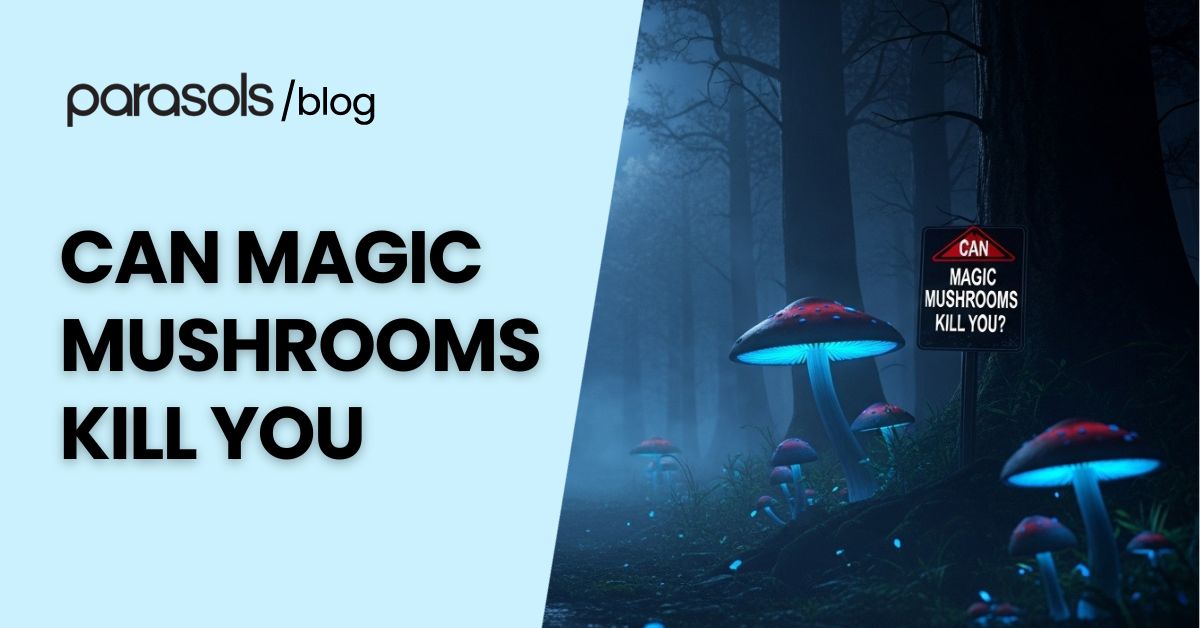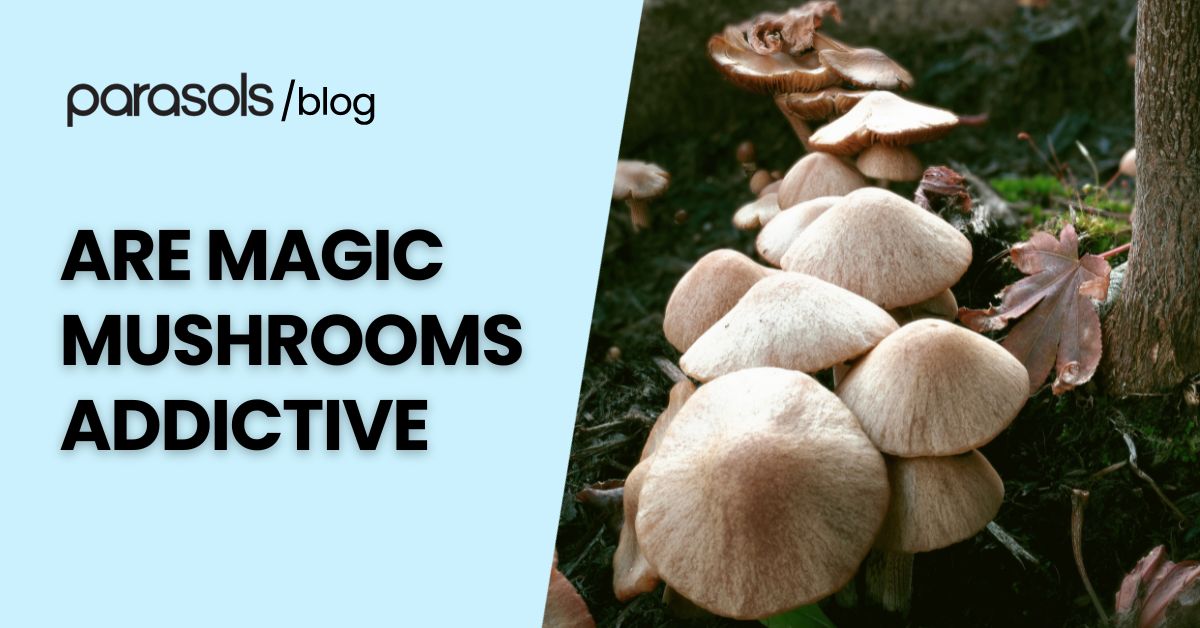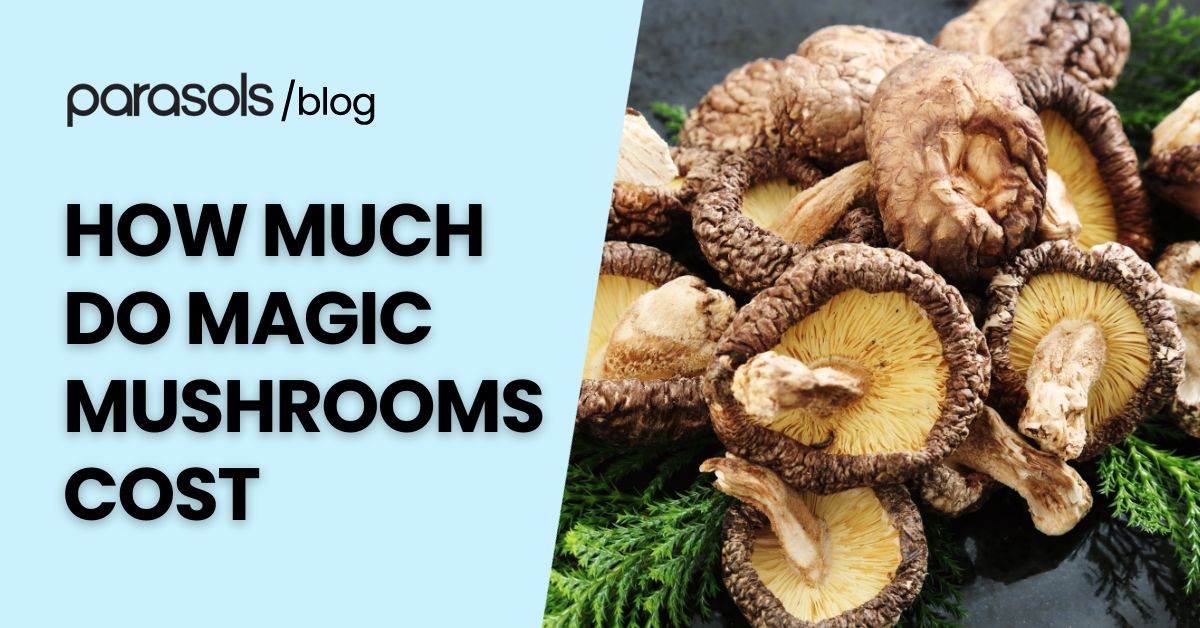Curiosity about magic mushrooms has grown as more people study their mind-altering effects and potential therapeutic benefits. But with all the talk about psilocybin mushrooms and their impact on mental health, it’s natural to wonder — can magic mushrooms kill you?
Before taking shrooms or experimenting with psychedelic mushrooms, it’s important to understand the real risks, safe practices, and when to seek medical attention.
Key Takeaways
- Magic mushrooms rarely cause death, but toxic lookalike species or reckless use can be deadly
- Most risks come from mushroom poisoning, impaired judgment, or panic-induced accidents
- Start with a low dose (around 1 gram dried) and take in a calm, safe environment
- Avoid mixing psilocybin with alcohol, drugs, or mental health medications
- Always stay hydrated, eat lightly, and have a sober sitter for safety
- Seek medical help immediately if severe hallucinations, rapid heart rate, or confusion occur
Can Magic Mushrooms Kill You?
While magic mushrooms rarely cause death on their own, they can still be extremely dangerous. A psilocybin overdose or ingesting toxic mushrooms mistaken for magic ones can lead to severe organ damage, dangerous behavior, or even death.
Most risks come from impaired judgment, panic attacks, or mushroom poisoning rather than the psilocybin itself.
Common Magic Mushroom Side Effects

Using magic mushrooms can trigger a range of physical and psychological effects that vary from person to person. While some experience profound spiritual or sensory changes, others may face intense discomfort or panic.
Here are the most common side effects to watch out for:
- Altered perception: Colors, sounds, and shapes may appear distorted, leading to visual and auditory hallucinations or an altered sense of time and space.
- Nausea and vomiting: Magic mushroom ingestion often causes stomach upset, especially when taken in high doses or eaten raw.
- Increased heart rate and blood pressure: Psilocybin mushrooms can raise blood pressure and heart rate, posing higher risk for people with underlying heart conditions.
- Severe anxiety and panic attacks: Some users experience extreme fear, paranoia, or loss of control, known as a “bad trip.”
- Muscle weakness and fatigue: Physical symptoms like trembling or loss of coordination can occur during or after mushroom use.
- Psychological distress: Magic mushrooms may trigger mental health problems, such as persistent psychosis or depression, especially in those with a history of mental health disorders.
- Sensory overload: Overstimulation from psychedelic effects can cause confusion, disorientation, and impaired judgment.
How to Eat Shrooms Safely
Learning magic mushrooms can be risky if you don’t take the right precautions. Whether for curiosity, self-learning, or therapeutic reasons, knowing how to take shrooms safely helps reduce the chances of a bad trip, overdose, or serious health concerns.
Start with a low dose
If it’s your first time taking magic mushrooms, begin with a small amount — around 1 gram of dried mushrooms or less. Everyone reacts differently, and starting low helps you gauge your sensitivity to psilocybin and avoid overwhelming hallucinations or severe anxiety.
Choose a safe, calm environment
Set and setting matter. Take psilocybin mushrooms in a familiar, comfortable space with people you trust. A calm environment helps prevent panic attacks, impaired judgment, and dangerous behavior caused by sensory overload.
Avoid mixing with other substances
Combining shrooms with other drugs, alcohol, or prescription medications can lead to unpredictable and potentially life-threatening reactions. Mixing psilocybin use with other substances increases the risk of overdose, high blood pressure, and severe organ damage.
Stay hydrated and eat lightly
Eat something light before your trip, and keep water nearby. Magic mushroom ingestion on an empty stomach can cause nausea and vomiting, while dehydration can worsen physical symptoms and anxiety.
Have a sober trip sitter
If you’re new to psychedelic mushrooms, it’s best to have someone sober around to monitor your well-being. A trip sitter can help you stay grounded, manage panic attacks, and seek medical attention if things take a dangerous turn.
Know when to seek medical help
In rare cases, a mushroom overdose or poisonous mushroom ingestion requires emergency medical treatment. If you experience severe hallucinations, rapid heart rate, or extreme fear, get emergency medical attention immediately.
Tips to Avoid Magic Mushroom Overconsumption
Taking too many shrooms can quickly turn a curious experience into a frightening one. To prevent a psilocybin overdose or dangerous effects, it’s important to approach mushroom use with awareness and self-control.
Here are some simple ways to avoid overconsumption:
- Know your dosage: Understand how many shrooms you’re taking and the strength of the psilocybe cubensis strain. Dried mushrooms are more potent than fresh ones, and even small variations can lead to stronger hallucinogenic effects.
- Avoid stacking doses: Resist the urge to take more if you don’t feel anything right away. Psilocybin can take up to an hour to kick in, and taking additional doses too soon increases the risk of a bad trip or mushroom overdose.
- Don’t mix with other substances: Combining magic mushrooms with alcohol, stimulants, or other drugs can amplify negative effects and make an overdose on shrooms more likely.
- Store mushrooms properly: Keep mushroom products in a cool, dry place. Consuming degraded or contaminated shrooms can cause nausea, vomiting, or even toxic mushroom poisoning.
- Take breaks between trips: Frequent psilocybin use can reduce sensitivity and strain your mental health. Space out your experiences to avoid psychological distress or protracted psychosis.
- Listen to your body: If you start feeling disoriented, nauseated, or anxious, stop taking more. Overconsumption can lead to extreme fear, sensory overload, and serious consequences that require medical help.
Final Thoughts

Magic mushrooms may seem harmless compared to other substances, but taking too many shrooms or mistaking toxic mushrooms for psilocybin mushrooms can have serious consequences. While psilocybin itself has low toxicity, the risks come from impaired judgment, unsafe environments, and mixing with other substances. Always prioritize safety, start small, and seek professional support if you experience ongoing mental health issues or distress.
If you’re considering trying magic mushrooms for personal growth or therapeutic reasons, learn more about safe and responsible psilocybin use here.
Frequently Asked Questions
Can you build a tolerance to magic mushrooms?
Yes, frequent mushroom use can lead to rapid tolerance. This means that taking psilocybin mushrooms repeatedly over a short period reduces their hallucinogenic effects, leading some users to take higher doses — which increases the risk of a bad trip or overdose on shrooms. It’s best to take long breaks between trips to let your body and mind reset.
Are store-bought mushrooms the same as magic mushrooms?
No, store-bought mushrooms are entirely different. The mushrooms you find in grocery stores are culinary varieties that contain no psilocybin or hallucinogenic effects. Mistaking wild or toxic mushrooms for magic ones can lead to mushroom poisoning, severe organ damage, or even death.
Can magic mushrooms interact with mental health medications?
Yes. Combining psilocybin use with antidepressants, antipsychotics, or anxiety medications can cause unpredictable effects. These interactions may blunt the hallucinogenic experience or trigger severe anxiety, confusion, or dangerous behavior. Always consult a healthcare professional before mixing psilocybin with other drugs or substances.
What should I do if someone experiences a bad trip?
If someone is experiencing extreme fear, panic attacks, or severe hallucinations, help them stay calm and in a safe environment. Avoid confrontation or loud noises, and reassure them that the effects will pass. If they show signs of self-harm, confusion, or physical symptoms like irregular heartbeat, seek emergency medical attention immediately.
Is it possible to develop an addiction to magic mushrooms?
Magic mushrooms don’t cause physical dependence like many other substances, but psychological dependence can occur. Some users may turn to frequent use as a way to escape daily life or cope with mental health problems. In such cases, support groups or psychological support can help manage underlying issues.
How long do the effects of psilocybin mushrooms last?
The hallucinogenic effects of psilocybin mushrooms typically begin 30 to 60 minutes after ingestion and can last anywhere from 4 to 8 hours, depending on dosage, body weight, and mental state. However, residual effects such as confusion, fatigue, or emotional sensitivity can linger for up to 24 hours.



Leave a comment
All comments are moderated before being published.
This site is protected by hCaptcha and the hCaptcha Privacy Policy and Terms of Service apply.